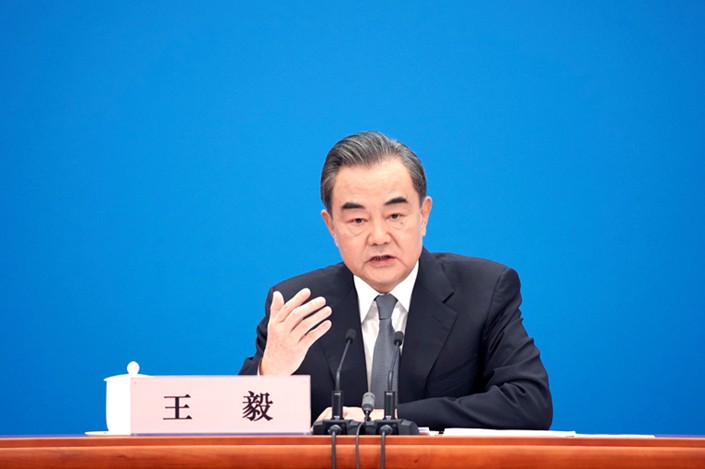Foreign Minister Talks Tough on U.S., Defends WHO, Promotes EU Cooperation

In a wide-ranging press conference on the sidelines of the annual meeting of the country’s legislature Sunday in Beijing, Wang Yi, China’s foreign minister and a member of the state council, responded to questions on China’s foreign policy, external relations and the world’s thorniest issues. Here are some highlights from the nearly two-hour event.
Pay for the pandemic?
When asked by the Global Times, a nationalist newspaper affiliated with the official People’s Daily, about several lawsuits filed in the United States demanding that Beijing pay restitution for damages inflicted by the coronavirus, Wang said the lawsuits are “ludicrous” and anyone who wants China to pay is “daydreaming.”
In the U.S., Republican attorneys general in Missouri and Mississippi have filed lawsuits making such demands, and Republican senators from Missouri, Tennessee and Arizona have proposed legislation in a similar vein.
“The attempt to file frivolous lawsuits is a shoddy one, as it has zero basis in fact, law or international precedence,” Wang said. “If anybody thinks they can use ludicrous lawsuits to undermine China's sovereignty and dignity, or deprive the Chinese people of their hard-won gains, they’re daydreaming and are disgracing themselves,” he said.
According to the U.S.’ Foreign Sovereign Immunities Act of 1976, a “foreign state shall be immune from the jurisdiction of the courts of the United States and of the states,” though there are a handful of exceptions associated with commercial activities and terrorism carried out in the country.
The WHO and the coronavirus
At the press conference, Wang defended the World Health Organization, a U.N. health body, over its handling of the Covid-19 pandemic and offered support to WHO Director-General Tedros Adhanom Ghebreyesus, a former health minister and foreign minister of Ethiopia. “Since the start of the outbreak, the WHO, under the leadership of Dr. Tedros, has followed science and given timely and professional advice at every turn,” he said. “The WHO is an international body made up of 194 sovereign states. It does not serve any particular country, and it should not defer to any country that provides more funding than others.”
However, Wang also said the WHO needs reform to “improve mechanisms and rules so as to remove the interference of political factors, value science and professional views, and preclude politicization and stigmatization.” China has pledged to donate $50 million in total to the WHO since the Covid-19 outbreak began.
Regarding the inquiry into the source of coronavirus, Wang said that “China is open to joint efforts by the international science community to identify the source of the virus. It is important that it is a professional, impartial and constructive process.” Last week, the WHO unanimously passed a resolution to conduct an “impartial, independent and comprehensive evaluation” into the global response to the pandemic.
Wolf Warrior diplomacy
Asked by CNN about China’s alleged “wolf warrior” diplomacy, a campaign that appears designed to counter Washington’s attacks on China with aggressive rhetoric, Wang said: “We never pick a fight or bully others, but we have principles and guts.”
"We will push back against any deliberate insult to resolutely defend our national honor and dignity. And we will refute all groundless slander with facts to resolutely uphold fairness, justice and human conscience," he said.
The term “wolf warrior” originated in a blockbuster nationalistic Chinese action movie, released in 2015, in which a special forces soldier battles a group of foreign mercenaries hired by a drug lord.
Zhao Lijian, a Chinese foreign ministry spokesman, is well-known for frequently criticizing America officials on Twitter, including U.S. Secretary of State Mike Pompeo and former National Security Adviser Susan Rice.
In March, in the face of Washington blaming Beijing for the pandemic — which first emerged in Wuhan in central China’s Hubei province — Zhao promoted a conspiracy theory on Twitter that the U.S. military could have brought the novel coronavirus to China. The tweet, later deleted by Zhao, triggered a diplomatic backlash.
Russia, EU and Southeast Asia
As China’s relations with the U.S. deteriorate, Beijing has been stepping up efforts to cooperate with Russia, the European Union and countries in Southeast Asia.
Wang hailed the strong relationship between China and Russia, two permanent members of the U.N. Security Council. “I believe that with China and Russia standing shoulder-to-shoulder and working back-to-back, the world will be a safer and more stable place where justice and fairness are truly upheld.”
Meanwhile, Wang said that China and the EU are engaging in high-level diplomacy, “actively exploring the possibility of holding a special China-EU summit when appropriate.”
He said the two sides “are working to wrap up negotiations on the China-EU investment agreement within the year.”
Unlike mistrust between China and the U.S., the foreign minister said China and the EU are “fully capable of building trust through equal-footed dialogue and of resolving differences through constructive communication.”
He also said China and Southeast Asian countries aim this year to sign the Regional Comprehensive Economic Partnership (RCEP), a regional free trade deal, to build a more integrated regional economy.
Contact reporter Lu Zhenhua (zhenhualu@caixin.com) and editor Michael Bellart (michaelbellart@caixin.com)

- PODCAST
- MOST POPULAR




